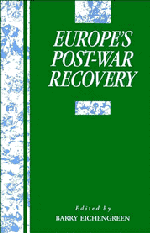Book contents
- Frontmatter
- Contents
- List of contributors
- Preface
- Part I Introduction and survey
- Part II The Marshall Plan
- Part III Other international initiatives
- 4 The IMF and the creation of the Bretton Woods System, 1944–58
- 5 The GATT's contribution to economic recovery in post-war Western Europe
- 6 The European Coal and Steel Community: an object lesson?
- 7 The European Payments Union: an efficient mechanism for rebuilding Europe's trade?
- Part IV Country studies
- Part V Synthesis
- Index
6 - The European Coal and Steel Community: an object lesson?
Published online by Cambridge University Press: 07 September 2010
- Frontmatter
- Contents
- List of contributors
- Preface
- Part I Introduction and survey
- Part II The Marshall Plan
- Part III Other international initiatives
- 4 The IMF and the creation of the Bretton Woods System, 1944–58
- 5 The GATT's contribution to economic recovery in post-war Western Europe
- 6 The European Coal and Steel Community: an object lesson?
- 7 The European Payments Union: an efficient mechanism for rebuilding Europe's trade?
- Part IV Country studies
- Part V Synthesis
- Index
Summary
The creation of the European Coal and Steel Community (ECSC) in April 1951 was a watershed in the history of the twentieth century. The event marks the beginning of a long-term integration process which, in fits and starts, is transforming a continent of formerly warring states into an economic and political federation. The ECSC was based on an original idea, supra-nationality: membership required transference of sovereign powers to a new European authority. The coal/steel pool did not, however, contain a new operating mechanism that propelled integration forward, as optimistic social scientists have maintained both at the time and since. Operationally, the ECSC was a disappointment. The popular notion that it could lead to sectoral integration, in which success in one field triggered success in another, has no basis in historical fact (see discussion in Milward, 1992).
Jean Monnet, the father of the proposal for the coal/steel union, was the source of the idea that supra-nationality would give rise to some higher form of economic and political organization. It suffuses the studies of political scientists and economists of the 1950s and 1960s. Only one major author of that era, Louis Lister, expressed theoretical reservations as to the value of the institution (Lister, 1960). More characteristic was a powerfully argued book of breathtaking scope written by Ernst Haas (1968), The Uniting of Europe: Political, Social and Economic Forces, 1950–1957. In it he predicted that the ECSC would have a very welcome and constructive “spillover effect” in which the formation of new interest groups at the European level would generate counterparts nationally and vice versa.
- Type
- Chapter
- Information
- Europe's Postwar Recovery , pp. 151 - 168Publisher: Cambridge University PressPrint publication year: 1995
- 1
- Cited by



